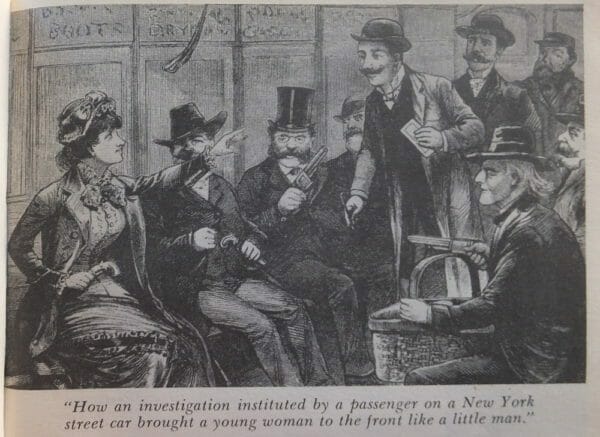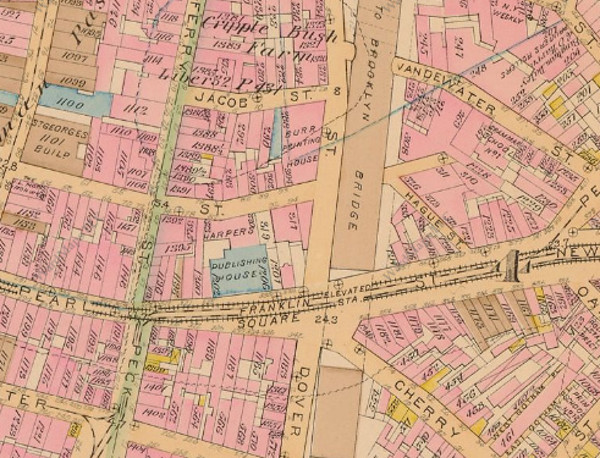
U.S.A. –-(AmmoLand.com)-– A version of the above image was published in the April 19, 1884 issue of the National Police Gazzette. The publisher was located at Franklin Square and Dover Street, New York. The location is in Manhattan, New York City.
The probably earlier version, shown above, is found in The Remington Historical Treasury of American Guns, published in 1966, taken from the New York Public Library Picture Collection.

In 1884, cable car lines were just starting to be considered in New York City, and electric trolleys were not yet in use. The street car in the image was almost certainly a horse-drawn street car, which existed in New York City until 1917.
The relevance of the image is pistols were commonly carried in New York City for self-defense in close proximity to the passage of the Fourteenth Amendment in 1868. Only six passengers are shown seated in the street car. Of those, four are not obscured by other people. All four of the unobscured passengers are shown as carrying pistols or revolvers in the illustration.
Public transportation was not considered to be a “sensitive location” where arms were not permitted.
The street car image was likely created before 1884; even so, 1884 is only 14 years after the Fourteenth Amendment was passed. There was no controversy. One of the major purposes of the Fourteenth Amendment was to ensure everyone in the USA had an enforceable right to keep and bear arms. One of the co-sponsors of the amendment pontificated on exactly that purpose.
From Senator Howard’s remarks, on the front page of the New York Times in 1866:
“…to these should be added the personal rights guarantied and secured by the first eight amendments of the Constitution; such as the freedom of speech and the press; the right of the people to peaceably to assemble and petition the Government for a redress of grievances, a right appertaining to each and all the people; the right to keep and bear arms;…”
(snip)
The great object of this amendment, is therefore, to restrain the power of the States and compel them at all times to respect these great fundamental guarantees. How will it be done under the present amendment? As I have remarked, they are not powers granted to Congress, and therefore it is necessary, if they are to effectuated and enforced, as they assuredly ought to be, that additional power should be given to Congress to that end. This is done by the fifth section of this amendment, which declares that “the Congress shall have power to enforce by appropriate legislation the provisions of this article.” Here is a direct affirmative delegation of power to Congress to carry out all the principles of all these guarantees, a power not found in the
Constitution.”
Those who wish a disarmed population are willing to follow the guidance of George Orwell in the novel 1984 and change history to aid their desire to exercise illegitimate power in the present. One of the clearest examples is the case of Michael Bellesiles falsifying history with his Bancroft prize-winning book, Arming America. Clayton Cramer, a software engineer, and historian, found many outright falsifications.
I sat down with a list of bizarre, amazing claims that Bellesiles had made, and started chasing down the citations at Sonoma State University’s library. I found quotations of out of context that completely reversed the author’s original intent. I found dates changed. I found the text of statutes changed—and the changes completely reversed the meaning of the law. It took me twelve hours of hunting before I found a citation that was completely correct. In the intervening two years, I have spent thousands of hours chasing down Bellesiles’s citations, and I have found many hundreds of shockingly gross falsifications.
Eventually, the Bancroft price was rescinded, and Bellesiles was disgraced. It would not have happened without the tireless efforts of Clayton Cramer and James Lindgren, a law professor. Except for those two men, Bellesiles would have gotten away with wholesale re-writing of history in pursuit of a political agenda.
The street car image helps refute the fabricated history that the carry of pistols was unusual and seldom allowed in the urban centers of the Northeast.
If that were true, there would have been no reason for New York State to pass the notorious Sullivan act in 1911.
—
About Dean Weingarten:
Dean Weingarten has been a peace officer, a military officer, was on the University of Wisconsin Pistol Team for four years, and was first certified to teach firearms safety in 1973. He taught the Arizona concealed carry course for fifteen years until the goal of Constitutional Carry was attained. He has degrees in meteorology and mining engineering, and retired from the Department of Defense after a 30 year career in Army Research, Development, Testing, and Evaluation.

from https://ift.tt/Rca7Oko
via IFTTT

No comments:
Post a Comment